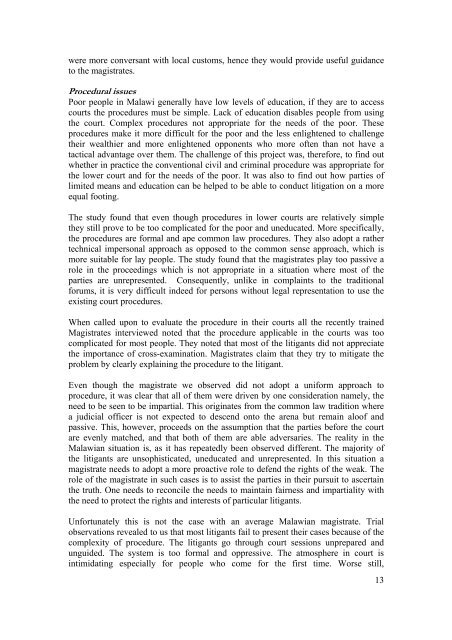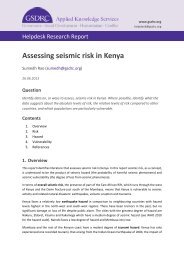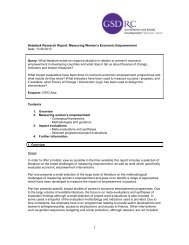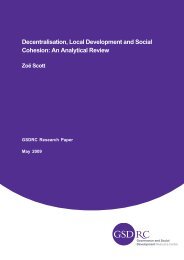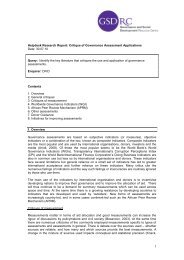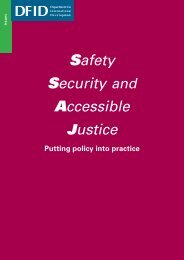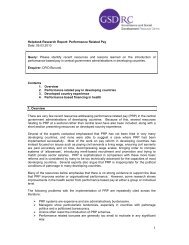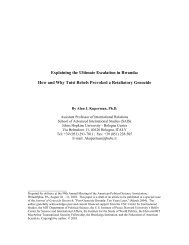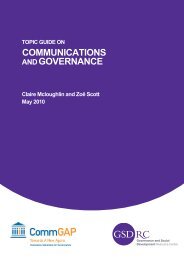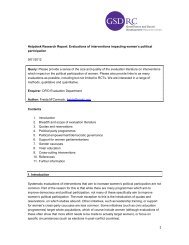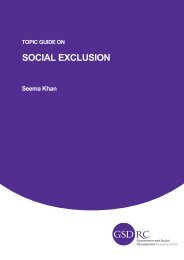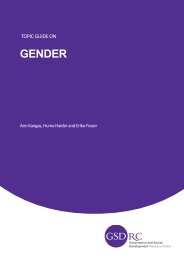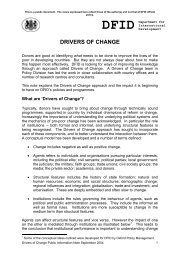ACCESS TO JUSTICE FOR THE POOR OF MALAWI? AN ... - GSDRC
ACCESS TO JUSTICE FOR THE POOR OF MALAWI? AN ... - GSDRC
ACCESS TO JUSTICE FOR THE POOR OF MALAWI? AN ... - GSDRC
- No tags were found...
You also want an ePaper? Increase the reach of your titles
YUMPU automatically turns print PDFs into web optimized ePapers that Google loves.
were more conversant with local customs, hence they would provide useful guidanceto the magistrates.Procedural issuesPoor people in Malawi generally have low levels of education, if they are to accesscourts the procedures must be simple. Lack of education disables people from usingthe court. Complex procedures not appropriate for the needs of the poor. Theseprocedures make it more difficult for the poor and the less enlightened to challengetheir wealthier and more enlightened opponents who more often than not have atactical advantage over them. The challenge of this project was, therefore, to find outwhether in practice the conventional civil and criminal procedure was appropriate forthe lower court and for the needs of the poor. It was also to find out how parties oflimited means and education can be helped to be able to conduct litigation on a moreequal footing.The study found that even though procedures in lower courts are relatively simplethey still prove to be too complicated for the poor and uneducated. More specifically,the procedures are formal and ape common law procedures. They also adopt a rathertechnical impersonal approach as opposed to the common sense approach, which ismore suitable for lay people. The study found that the magistrates play too passive arole in the proceedings which is not appropriate in a situation where most of theparties are unrepresented. Consequently, unlike in complaints to the traditionalforums, it is very difficult indeed for persons without legal representation to use theexisting court procedures.When called upon to evaluate the procedure in their courts all the recently trainedMagistrates interviewed noted that the procedure applicable in the courts was toocomplicated for most people. They noted that most of the litigants did not appreciatethe importance of cross-examination. Magistrates claim that they try to mitigate theproblem by clearly explaining the procedure to the litigant.Even though the magistrate we observed did not adopt a uniform approach toprocedure, it was clear that all of them were driven by one consideration namely, theneed to be seen to be impartial. This originates from the common law tradition wherea judicial officer is not expected to descend onto the arena but remain aloof andpassive. This, however, proceeds on the assumption that the parties before the courtare evenly matched, and that both of them are able adversaries. The reality in theMalawian situation is, as it has repeatedly been observed different. The majority ofthe litigants are unsophisticated, uneducated and unrepresented. In this situation amagistrate needs to adopt a more proactive role to defend the rights of the weak. Therole of the magistrate in such cases is to assist the parties in their pursuit to ascertainthe truth. One needs to reconcile the needs to maintain fairness and impartiality withthe need to protect the rights and interests of particular litigants.Unfortunately this is not the case with an average Malawian magistrate. Trialobservations revealed to us that most litigants fail to present their cases because of thecomplexity of procedure. The litigants go through court sessions unprepared andunguided. The system is too formal and oppressive. The atmosphere in court isintimidating especially for people who come for the first time. Worse still,13


